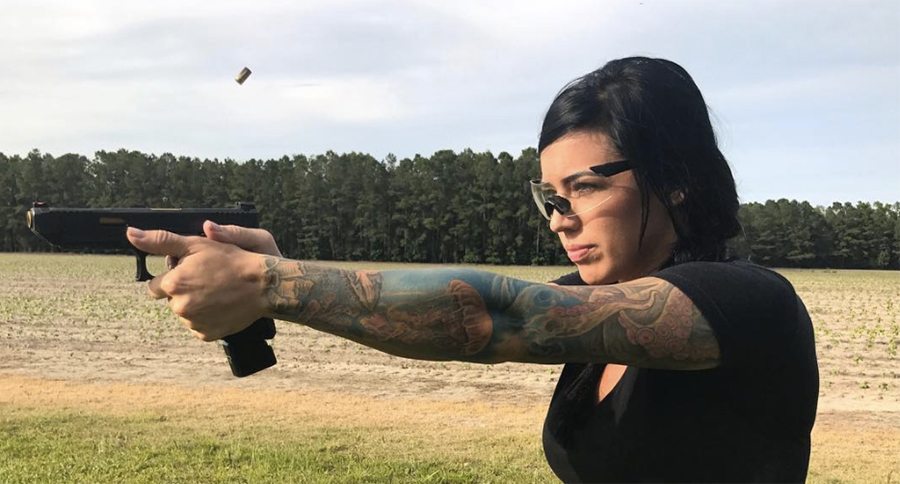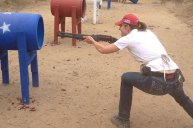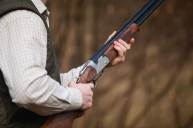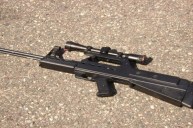Far too many shooters spend much too little time training, and when they do train, they overlook the basics. If you want to be a better marksman, follow these five points.
Let me start by saying that these are basic tenets of good handgun shooting. They are not developed into the deeper aspects of each topic. For that, we could go on forever. Take these points and build.
1. Grip
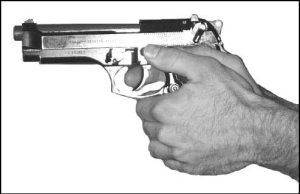
Image courtesy Daniel Leathers
There are a few things that hold true about the grip and its importance to better marksmanship. It is the foundation of better shooting and the basic building block of marksmanship when it comes to handguns. However, there are also a lot of things you'll read or hear that are pure conjecture.
Here are the basic truths of the grip. The best grip is the one that is safe and comfortable. What is best for me may not be for you. The grip must not choke the gun, but must still give you total control over the firearm. If you're shooting a semi-automatic pistol, DO NOT cross your thumb over the back of the slide - it hurts.
Some people say to hold the gun in your strong hand. However, that is not always the case. You may choose to switch hands due to eye dominance. Keep these basic points in mind and build from there.
2. Stance

Image courtesy Daniel Leathers
Stance is a lot like grip and has the same basic points. It must be safe and comfortable. Are there stances that yield themselves to better accuracy? Absolutely. In fact, the stance and the grip go hand in hand, so to speak.
The key is to be sure you have a firm stance that allows you to remain in control of the firearm and allows you to depart a dangerous scene easily and with haste, if needed.
Generally, you want to keep your feet shoulder width apart and planted firmly on the ground. (The same is true for your knee and such in various positions). Bring your gun to eye level instead of dropping your head to meet the sights and be sure to flex slightly at the knee. If nothing else, it'll keep you from locking your knees and passing out.
3. Breathing (Resting)
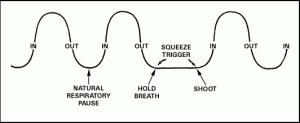
Image courtesy Daniel Leathers
The breathing chart above is for a single shot with a break between. You may find yourself asking, what difference does breathing make? After all, it's a natural process, right? Right.
However, like many natural processes, you need to control your breathing to allow for more accurate shot placement. The image shows what it means to "hold your breath." I'll never forget growing up and being told to hold my breath and then pull the trigger. No one ever explained what that meant. Not even when I joined the Army.
While preparing to qualify for the US Army Sniper School and continuing my tutelage in marksmanship, I came to realize the reality is that you "hold your breath" for a split second. Just long enough to stop your body movement.
If you find your shots hitting along a vertical line on the target, your problem is breathing. More than holding your breath, you allow your body to come to a rest and then fire.
4. Aiming
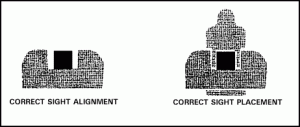
Image courtesy Daniel Leathers
The biggest issue people have with aiming is more of a problem with looking. Where are you looking? Most people focus on the target. After all, that's where you're trying to hit. When you do, your aim is off and so will be your impact.
While you want to be aware of the rear right and target, your primary focus should be on the front sight. The simple reason for this is that where your front sight is pointing is where the bullet will go. It's simple and to the point.
5. Issues
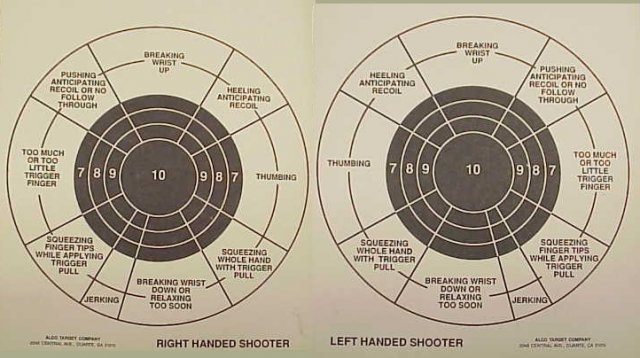
Image courtesy Daniel Leathers
I pass this card out to all of my students. Let's say you've perfected all of the previous four points, but you still aren't hitting the target where you should. That means you're still doing something wrong, but what?
This card is a mirror image of itself based on which hand you shoot with. Study it. Then go shoot. See where your rounds are striking the target and then compare it to this diagram. I won't go into detail about what each item is, you can search for that (or feel free to contact me with questions).
What I will say is this. You don't have to waste ammunition in order to work on most of these factors. A nice laser will do the same. In fact, it helps to let you see your movements.
Whatever method you use, remember these basic building blocks of better handgun marksmanship.
NEXT: ARE KIDS REALLY THE FUTURE OF HUNTING AND FISHING?
